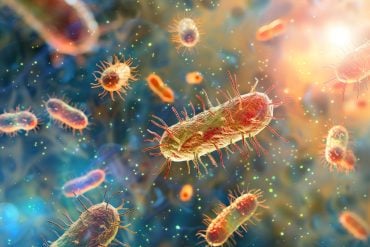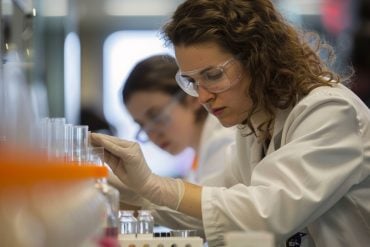Summary: Study reports a slightly elevated genetic risk of depression, schizophrenia, and neuroticism among adoptees. However, no association was found between the interaction of genetics and adoption on mental health. While adopted children had a slightly elevated risk for mental health disorders, the adoption process did not appear to increase the impact of the genetic risk.
Source: Elsevier
The adoption of children is a fundamental method of building families. However, adoptees may face subsequent adaptive challenges associated with family stress at the time of birth and during the adoption process.
It should be no surprise, then, that adoptees have a small but well-known increased risk for depression, anxiety and other mental health disorders. The health effect has been attributed to stressful early childhoods. But genetics also plays a role, according to a large new study published in Biological Psychiatry, published by Elsevier.
“We found adopted individuals on average had a somewhat higher genetic risk for mental health problems, but the effects are quite small,” said lead author Kelli Lehto, PhD, a postdoctoral researcher at Karolinska Institute in Stockholm. “Overall, the main message here is that both environment and genetics are important.”
Psychiatric disorders, including depression, anxiety and schizophrenia are, to varying degrees, heritable. Genome-wide association studies (GWAS) have identified a growing number of genetic markers associated with the risk for most major psychiatric disorders so that a ‘polygenic risk score’ for these disorders may be estimated.
Dr. Lehto and colleagues analyzed the genomic and health information data of 243,797 participants in the UK Biobank, a major health resource established by the Wellcome Trust and others, including a group of 3,151 who were adopted as children within Britain, mostly in the 1950s and 1960s.
Overall, the adoptees in the study reported being happy and satisfied with their lives. When compared to the general population, they were more likely to be male, to smoke, have less education, attain a lower income, and to experience more stressful life events. Adoptees also had slightly more mental health problems, such as depressive symptoms, bipolar disorder, higher neuroticism and loneliness.
The researchers found a slightly elevated genetic risk of depression, schizophrenia and neuroticism among adoptees. They did not find however, any evidence of interaction between genetics and adoption on mental health. Thus, while children put up for adoption were at increased genetic risk for developing symptoms of mental illness, the adoption process did not appear to increase the impact of this genetic risk.
“Basically, genetic risk and adoption each are predictors of psychiatric problems,” explained Dr. Lehto. “It’s important to highlight that adoption and genetic risk each only contributed a small amount to the individual differences in mental health. That indicates many more factors contribute to the development of mental health problems.”

“There are many complicated issues to consider in these findings,” John Krystal, MD, Editor of Biological Psychiatry. “But the most straightforward implication is that adopted children may face both special environmental and genetic risks for adjustment problems and mental illness. Awareness of these risks increases the importance of programs aimed at early detection and intervention for these children.”
The findings of this study of people with UK-based ancestry pertain only to people of European ancestry and the results might be different in other groups. Scientists note significant racial and ethnic differences in the findings from genome-wide association studies (GWAS).
“It would be important to study resilience factors as well as risk factors, Dr. Lehto said.
“The differences between adoptees and the rest of the population are very small. Generally, adoptees are doing well.” The findings may apply to other types of childhood adversity and adult mental health outcomes among non-adoptees, she added.
Source:
Elsevier
Media Contacts:
Rhiannon Bugno – Elsevier
Image Source:
The image is in the public domain.
Original Research: Open access
“Childhood Adoption and Mental Health in Adulthood: The Role of Gene-Environment Correlations and Interactions in the UK Biobank”. Kelli Lehto et al.
Biological Psychiatry doi:10.1016/j.biopsych.2019.10.016.
Abstract
Childhood Adoption and Mental Health in Adulthood: The Role of Gene-Environment Correlations and Interactions in the UK Biobank
Background
Being adopted early in life, an indicator of exposure to early-life adversity, has been consistently associated with poor mental health outcomes in adulthood. Such associations have largely been attributed to stressful environments, e.g., exposure to trauma, abuse, or neglect. However, mental health is substantially heritable, and genetic influences may contribute to the exposure to childhood adversity, resulting in potential genetic confounding of such associations.
Methods
Here, we explored associations between childhood adoption and mental health–related outcomes in midlife in 243,797 UK Biobank participants (n adopted = 3151). We used linkage disequilibrium score regression and polygenic risk scores for depressive symptoms, schizophrenia, neuroticism, and subjective well-being to address potential genetic confounding (gene-environment correlations) and gene-environment interactions. As outcomes, we explored depressive symptoms, bipolar disorder, neuroticism, loneliness, and mental health–related socioeconomic and psychosocial measures in adoptees compared with nonadopted participants.
Results
Adoptees were slightly worse off on almost all mental, socioeconomic, and psychosocial measures. Each standard deviation increase in polygenic risk for depressive symptoms, schizophrenia, and neuroticism was associated with 6%, 5%, and 6% increase in the odds of being adopted, respectively. Significant genetic correlations between adoption status and depressive symptoms, major depression, and schizophrenia were observed. No evidence for gene-environment interaction between genetic risk and adoption on mental health was found.
Conclusions
The association between childhood adoption and mental health cannot fully be attributed to stressful environments but is partly explained by differences in genetic risk between adoptees and those who have not been adopted (i.e., gene-environment correlation).






